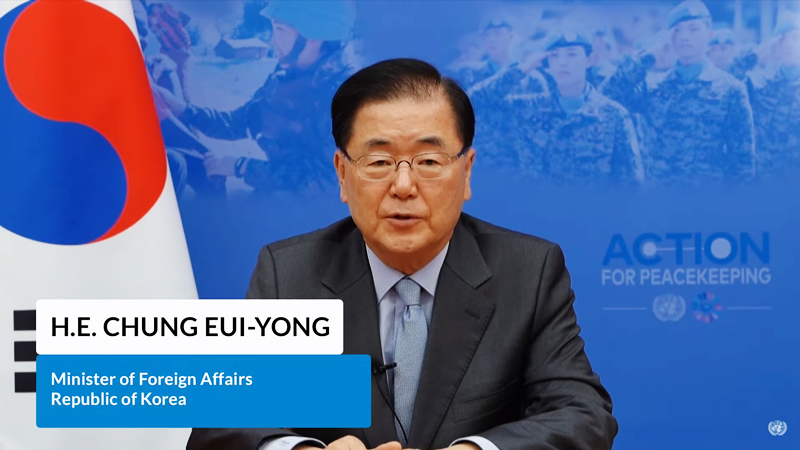연설문
평화유지구상(A4P) 3주년 기념행사 기조연설(3.29.)
- 작성일
- 2021-03-30 15:59:10
- 조회수
- 16606

Prime Minister Rutte,
Secretary-General Guterres,
Ladies and Gentlemen,
I am truly honored to celebrate with you the 3rd Anniversary of the Action for Peacekeeping initiative.
As you all know, the Republic of Korea is a direct witness to the UN's commitment to peace. Seven decades ago, when our nascent Republic was embroiled in armed conflict, the United Nations came to restore peace under the "Uniting for Peace” resolution.
Korea's rise as a peaceful, democratic, and prosperous nation since then owes much to the UN's commitment and assistance during that critical period. I hope that this can serve as a powerful reminder how important and impactful our work here could be for other conflict areas.
We have much to be proud of our success in the completion of Peacekeeping missions in other countries, such as Liberia, Sierra Leone, and Cote d'Ivoire. And they all are bringing peace back to the daily lives of ordinary people there.
The A4P provides the blueprint for replicating these success stories by strengthening the effectiveness of UN peace operations.
Despite the progress made, however, peace operations continue to face complex challenges in the face of growing intractable conflicts and the emergence of new threats.
I would like to highlight three areas that peacekeeping operations should focus on to meet those challenges today and into the future.
First, peacekeeping operations should be inclusive. Peace operations should be better aligned with broader efforts toward political settlement and conflict prevention.
Contributing countries, host governments, regional organizations, and most importantly, the local communities should be brought together to take part in resolving the underlying cause of conflict. In particular, we should ensure and promote the participation of more women in peacekeeping efforts to eliminate sexual violence in conflict.
Second, peacekeeping operations should be pursued in the broader context of building sustainable peace.
Assistance for social and economic development should go hand in hand with any peace operations if that hard-won peace is to become resilient and long-lasting.
Third, peacekeeping operations should be forward-looking. Global trends ranging from climate change to pandemics are redrawing the lines of conflicts and posing new challenges to international security.
We should prepare ourselves to these emerging threats to peace and provide our peacekeepers with the necessary tools and equipment to perform their tasks in this new environment.
As the next host of the Peacekeeping Ministerial this coming December, the Republic of Korea will spare no effort in facilitating the discussions to make UN peacekeeping more effective and relevant.
I have no doubt that the Seoul Ministerial will be another important occasion to sustain the momentum for A4P, while mobilizing tangible and concrete commitments to make peacekeeping fit for purpose.
Ladies and Gentlemen,
In recent years, our efforts have significantly eased tensions on the Korean Peninsula, but we still have a long way to go to build lasting peace.
My government remains fully committed to the peace process taking root. And to this end, the continued and unwavering support of the United Nations and the international community will be essential.
I hope today's discussions will bring wisdom and insight for future peacekeeping operations.
Thank you very much.
-------------------------------------------(비공식 국문 번역문)-------------------------------------------
루터 총리님,
구테레쉬 사무총장님, 참석자 여러분,
평화유지구상 3주년을 기념하는 뜻깊은 자리에
참석하게 되어 진심으로 영광입니다.
한국은 평화를 위한 유엔의 의지가 발현된 공간입니다.
70여년 전 건국 초기 대한민국이 전쟁의 소용돌이에 휩싸였을 때,
유엔은 ‘평화를 위한 단결(Uniting for Peace)’결의 하에
평화 재건을 위해 우리를 도왔습니다.
한국이 평화롭고, 민주적이며, 번영하는 국가로 성장한 것은
결정적인 시기에 유엔의 역할과 도움이 있었던 덕분입니다.
이러한 한국의 사례는 분쟁지역에서 유엔의 평화유지활동의 중요성과 영향력을 상기시키는 강력한 본보기가 될 것으로 생각합니다.
그간 평화유지활동 임무단이
라이베리아, 시에라리온, 코트디부아르 등에서
평범한 사람들이 일상의 평화를 찾을 수 있도록 돕고
임무를 완료한 것은 훌륭한 성공사례입니다.
평화유지구상(A4P)은 유엔 평화유지활동의 효과성 강화를 통해
이러한 성공사례를 재생산하기 위한
청사진을 제공하고 있습니다.
그간의 진전에도 불구, 유엔 평화유지활동은
만성적인 분쟁의 지속과 새로운 위협의 대두에 따라
복합적인 도전에 직면하고 있습니다.
이러한 현재와 미래의 도전을 극복하기 위해
저는 앞으로 평화유지활동이 나아가야 할 방향을
아래 세 가지로 제시하고자 합니다.
첫째, 평화유지활동은 포용적이어야 합니다.
평화유지활동은 정치적 해결 및 분쟁의 방지를 위한 노력과
한층 긴밀히 연계되어야 합니다.
병력 공여국, PKO 주둔국, 지역기구, 현지 주민들 모두가
분쟁의 근본 원인을 해결하기 위해 머리를 맞대야 합니다.
특히, 분쟁 하 성폭력 근절을 위해 평화유지활동에 여성의 참여를
보장하고 증진해야 합니다.
둘째, 평화유지활동은 지속적인 평화구축의 맥락 하에서
이루어져야 합니다.
어렵게 얻은 평화를 공고히 유지하기 위해서는
평화유지활동이 경제‧사회 개발 지원과 유기적으로 이어져야 합니다.
셋째, 평화유지활동은 진보해야 합니다.
기후변화, 감염병 확산 등 전지구적 환경 변화는
분쟁의 경계를 바꾸고 국제안보에 새로운 도전을 야기하고 있습니다.
평화에 대한 새로운 위협에 대비하고
평화유지 요원들이 새로운 환경에서 임무를 수행할 수 있도록
필요한 기술과 장비를 제공해야 합니다.
한국은 금년 12월 차기 ‘유엔 평화유지 장관회의’ 주최국으로서,
유엔 평화유지활동의 효과성과 효용성 제고를 위한
국제사회의 논의를 촉진하는 데 적극 기여해나갈 것입니다.
서울 평화유지 장관회의는 평화유지구상의 모멘텀을 유지하고
평화유지활동의 효과성을 강화하기 위한
구체적, 실질적 공약을 결집하는 좋은 기회가 될 것으로 확신합니다.
참석자 여러분,
그간의 노력으로 한반도의 긴장 완화에 상당한 진전이 이루어졌으나,
항구적 평화 구축을 위해서는 아직 많은 과제가 남아있습니다.
우리 정부는 한반도 평화 프로세스가 뿌리를 내릴 수 있도록
최선의 노력을 다해나갈 것이며, 이를 위해서는 유엔과 국제사회의 변함없는 확고한 지지가 필수적입니다.
오늘 회의에서 앞으로의 평화유지활동을 위한
지혜와 통찰을 얻을 수 있기를 기대합니다.
감사합니다.
